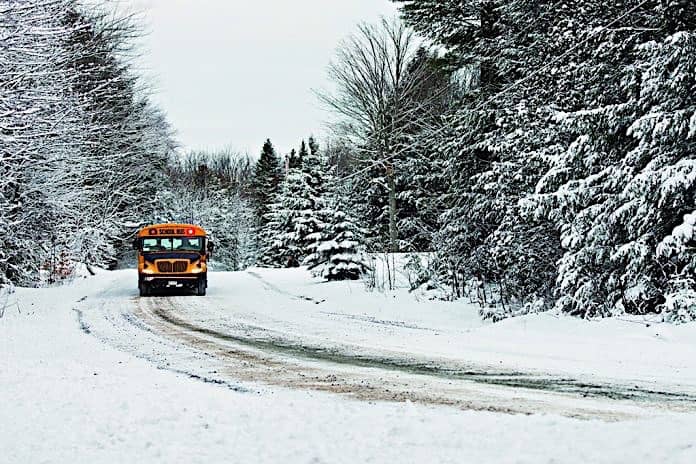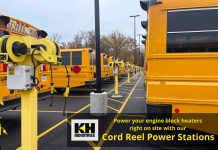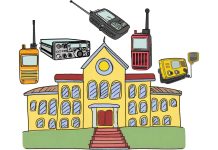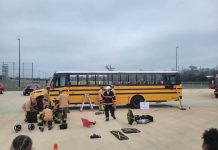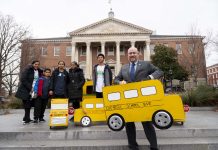Preparing bus fleets for equipment-abusing slush, snow, salt and cold is more than just a matter of being in the moment. Due to this, transportation directors often begin their winter preparations years in advance.
Daniel Schultz, transportation director for the Southeast Polk School District in Iowa, said his garage crew starts its winter maintenance activities during the summer months. But the real first steps begin during the bidding process, when Southeast Polk orders double-pane windows and undercoat rust protection.
“One of the things we do when ordering buses is look to prevent problems,” he said. “We try to prepare all our buses by ordering them with winter in mind. Because our replacement schedule is 18 years, we’re always looking far down the road to try to make them last and I’m trying to make sure they’re functional that long.”
School bus manufacturers are answering the call when it comes to rust. Three years ago, Arrowhead Steel Co. began supplying IC Bus with a specially treated steel for the manufacturer’s redesigned driver platform.
Arnie Koldenhoven, president of Arrowhead Steel, said that every IC Bus driver platform comes equipped with the longer-lasting Intercoat™ Chemguard with InterReactive™ Coating Technology steel, and districts also have the option of ordering it for the entire bus floor.
“A bus fleet owner in Arizona is not as worried as one in Chicago or other places about having the severe weather option. But when a fleet manager says he looks for the right product during the construction process, this would be an example,” he added.
Meanwhile, Thomas Built Buses includes four levels of corrosion protection treatments inside, outside and underneath the bus with its FleetShield solutions. Blue Bird Armor Coating protects the undercarriage as well as exterior components, like steel bumpers and fuel tanks.
No matter how well-engineered a bus may be, proactive, preventative maintenance remains a necessity to ensure engines turn over, stop arms extend, emergency exits open and rust is held at bay as long as possible.
“We have been preparing for winter all summer,” Schultz said. “We’re checking tires to make sure they have plenty of tread that will last through the winter. Our monthly inspections add certain things for certain times of the year. Tires, batteries and heater motors will get extra check-outs. We don’t schedule heater motor replacements—they run until fail—but you’ll hear the bearings before they give out and they get replaced right away.”
Stop arms are always part of the daily inspections at Adams 12 Five Star Schools near Denver, but extra attention is given to ensure there’s no ice build-up in the mechanism. Emergency exits, which are also part of daily inspections, receive closer scrutiny from drivers and mechanics wary of freeze-overs.
“We have the drivers check them and mechanics check and lubricate them,” said David Anderson, Adams 12’s director of transportation and fleet services. “Between the two of them, I think that’s a pretty good system for making sure they’re checked and good to go.”
When temperatures drop to zero, the Southeast Polk crew arrives early to double-check breakers and make sure block heaters are working. In addition to some fall maintenance on the Webasto fuel heaters in its 163 buses, the Adams 12 Five Star team also double checks that timers are set to start the heaters at 4 a.m. on cold days. And for those “really bad, below-zero” days, the district presses block heaters into action.
“The last thing I need is 20 buses that won’t start,” Anderson said. “Checking coolant freeze points and making sure they’re up to snuff is something else that’s part of our (preventative maintenance).”
Anderson said tire pressure also requires more attention as winter approaches, “We can have a 70-degree day and a 30-degree night so tire pressures really fluctuate,” he added. “You’ve got to make sure you’re checking that regularly.”
Winter preparation is a year-round event at the Thornton, Colorado, district. But, its ace in the hole is a brushless washer system installed when the district built a state-of-the-art bus facility in 2010.
“The salt and (magnesium chloride) they use on the roads are very harmful to brakes and undercarriages,” Anderson said. “It eats through components and air valves. Up to five years ago, we didn’t have anything that could really get hot water up under the buses. I really insisted that we have two undercarriage sprayers to really knock that gunk off. It’s amazing how much work it saves. Before, we were having brake chambers literally eaten up by road salt and all that has been eliminated. Now that we have (the washer system), I can’t imagine being without it.”


